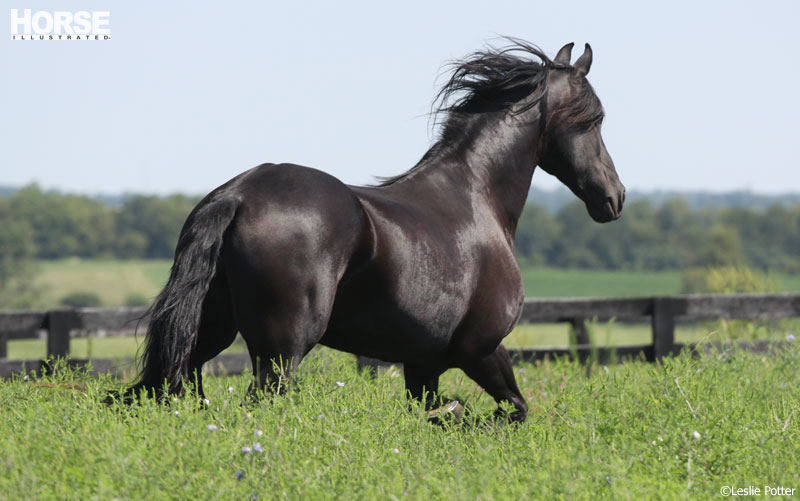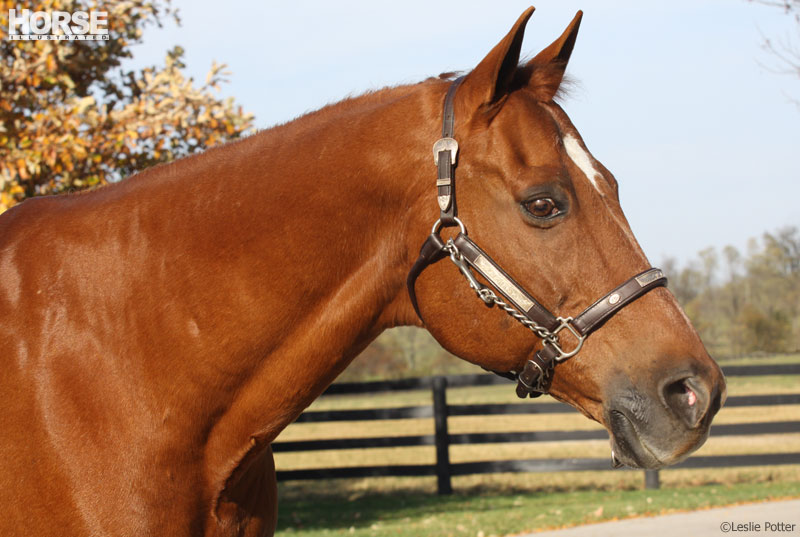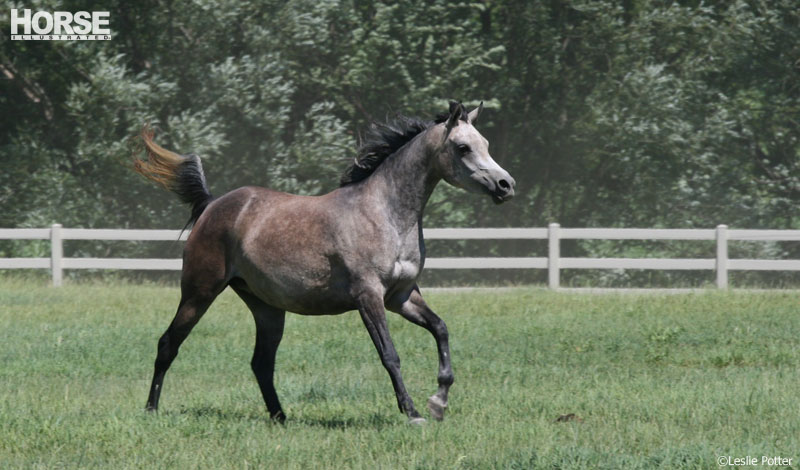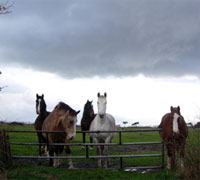
Friesian
One of the great joys of horse ownership is the skewed regard with which you get to view your personal steed. Believing in his or her superiority is a deserved perk of the debt load that often accompanies an equestrian lifestyle. It also grants you membership to a condition I call breed bias. Much like pledging a sorority or fraternity, this mind state involves a combination of pride, delusion, and acceptance of unexamined facts.
Throughout our recent history of creating breed registries by emphasizing particular traits and characteristics, we have admittedly assisted in the evolution of some fine horse flesh. We have also, however, narrowed our perspective in interesting ways. We have created entire groups of horses that we assume possess identical ways of thinking, behaving, and training.
This perspective begins when a person buys a new horse, who we’ll call Prancer, and then begins palling around with other owners of the same breed , who we’ll call breed X. The new owner is told immediately about all the exceptional traits of breed X. They learn how unlike plain ordinary horses breed X is, how they require specific farriers and saddle types, and how they should only be trained by someone expert in X breed. At this point, Prancer’s owner might wonder: isn’t a horse a horse? Or are the different bloodlines really like separate clans? Soon, Prancer’s owner joins the X breed club, buys all kinds of special equipment, outfits, and farrier services. She wonders how she got along for so many years previously just by treating every horse she encountered like a horse. Now she knows better. She will now regard them as the Morgans or Arabians or Friesians that they are.

American Quarter Horse
Let me clarify, members of particular breed groups DO share traits as a general rule. For instance, I most often equate angst-ridden head flipping dressage performances with Thoroughbreds, and dull plodding ones with draft crosses. Yet there are always exceptions and surprises like the occasional Arabian who just plain never spooks, the rare unfriendly Friesian, some Quarter Horses that do not like cows, and so on.
I point this out because I often witness the generalized rules of breed specialties stretched in liberal ways. Years ago, a breed registry that I’ll leave unidentified promoted the slogan “Born Broke,” essentially promising that this breed of horse sprung from their dams’ wombs fully obedient and mostly trained. Generally speaking, most of these horses possessed a relatively calm demeanor but that is not the same thing as being broke. And I should clarify that there were PLENTY of them that did not fit the description of calm or broke. Unfortunately, the biased rhetoric stuck. Scores of amateur owners bought the hype. They paid their money and joined the clan.
Their first clue that “Born Broke” was a generalization rather than a firm rule should have come when they went shopping for bridles and bits. This same breed promoted a special bit designed and produced exclusively for their members. It looked like a cross between barbed wire and bicycle chain. It lacerated the palm of anyone who tried to hold it. Conceivably, if someone needed that kind of apparatus in a horse’s mouth to control him, the horse missed being born broke and likely will NEVER be broke.

Arabian
Several years ago, I met an Andalusian breeder here in California who swore her breed never bucked. She honestly believed they lacked the genes responsible for this natural behavior. Other lowly breeds?, sure they bucked, but not Andalusians. Another student was adamant that every single Morgan in the U.S. preferred sugar cubes over carrots. It was just a “Morgan thing,” she promised me.
As a rule, I prefer not to apply generalizations across breeds because it prevents preconceptions from steering my training. If you’re aiming to build on the traits a horse shares with his breed and he does not possess any of those traits, your approach won’t go anywhere. It might not be very hip in our brand-oriented culture, but I find it best to just treat a horse like a horse. Quite frankly, many breed truisms are not very true. And just to make this point, I’m going to go turn out my Andalusian who, for the record, bucks like a bronco.
Read more about horse breeds:
Horse Breed Profiles
Resources: Horse Breed Associations






interesting
I think this could have been far more in depth, to be honest. I photographed many breeds shows over the years, some at venues that had multiple breed shows running at the same time. I heard complaints about the other breed or the breed people all the time. But breed bias can have really negative impacts. In particular OTTBs, though the groups promoting them have helped in combating that recently. I think what should be emphasized is finding the right horse for each rider’s goals, abilities, and discipline, not just relying on the right breed.
The easiest proof of this breed myth is to let the horses be on their own, and you’ll be sure that a stallion of one breed will mate the mare of another given the chance! So there is nothing inherent, except for it all being in the minds of the humans. No different than what we do to our own children! There’s part nature, and part nurture.
so tru!
at 76 1/2 I have seen breed “fads” come and go, change of disciplines and goals changes needs for certain physical qualities in horses. Study ourselves in depth first to find out why we do things, then correlate it with why the changes happen
Isn’t a horse about their own personality and not their breed? I see this breed snobbery all the time. But I think, a horse is a horse of course of course;)
Thanks for mentioning the saddles. I love that one, particular when it comes to Arabian saddles – they do, of course, have some of the most varied backs of all!
Well, a horse is a horse and I love them all, but… of course I have favourite breeds!
And of course, you immediately use this very article to perpetuate the stereotype that Arabians are “spooky.” They NOTICE things, it is their handlers freaking out with the OMG! He’s going to spook! reaction that makes things “spooky.” An Arabian is the mascot who led the Denver Broncos onto the field at the Super Bowl; that is not a task for the faint hearted
not so much the breed as it is a horses coat I am partial to horses with lots of color mainly paints and pintos
I fell for the “all quarter horses are sweet” one. Ha. My quarter horse tried to kill me once when I went in the pen to catch him. He’s never tried it again, but he’s incredibly unpredictable.
Great article but, sad;y, the Justin Morgan was not mentioned.
This is an excellent article. I sincerely hope that many people will read it and are willing to
open their minds and learn some facts. It is always dangerous to speak in “absolutes” just as it is dangerous and foolish to generalize.
Quarter horses all the way.
I love Arabs, but I cringe every time someone asks what breed of horse I own because of the insults often hurled. I don’t understand why rude behavior is acceptable in horse circles. Buy the breed you want and let the other person do the same.
Breed bias can become breed prejudice not only at shows but in barns also. Sadly some treat certain breeds “better” than others, many times unconsciously.